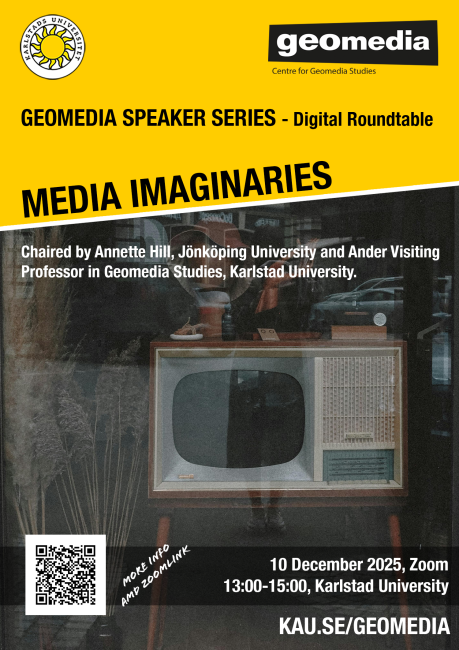Geomedia Speaker Series
Geomedia Speaker Series is a series of lectures and workshops focusing on the field of geomedia studies, i.e., the intersection of media and communication studies and human geography. Internationally leading researchers from different disciplines are invited to give an open lecture and participate in a thematic workshop with members of the Geomedia centre, and other interested parties. Our events are organized on campus as well as online.

MEDIA IMAGINARIES
- 10 December 2025
- 13:00-15:00 (local time, Sweden)
- Zoom Link
Chair
Annette Hill, Jönköping University and Ander Visiting Professor in Geomedia Studies, Karlstad University.
Roundtable Authors
Melissa Avdeeff (University of Stirling), Lisa Blackman (Goldsmith’s College London), Imke Henkel and Tim Markham (University of Leeds and Birkbeck, University of London), Magnus Johansson (Lund University), Michael Rübsamen and Joanna Doona (Lund University) and Ian Reilly (Mount St Vincent University).
Respondents
Simon Dawes (Université de Versailles Saint-Quentin-en-Yvelines) and Joke Hermes (InHolland University).
Media imaginaries are shape shifters, taking multiple forms as make believe, as thinking outside the box and as social practices. This online research seminar showcases new scholarship on media imaginaries in a forthcoming edited collection Media Imaginaries, published by Intellect Press in 2026.
Multiform imaginaries coexist within and as products of the dialectics of the real and the imaginary, e.g. technological visions, or post-truth politics. How we create, talk about, dislike and dispute the stories and myths, facts and fictions regarding media related issues such as the environment and mobility, platforms and technologies, or inequalities and social justice, is of pressing concern for media researchers and industry professionals, audiences and publics.
In this roundtable, international scholars explore media imaginaries as a tool for reflection. Different chapters examine imaginaries as multiform, providing space for dialogue on themes of political-social imaginaries, cultural-technological imaginaries and reflecting imaginaries.
Key questions addressed in this roundtable include how do we imagine media today, yesterday or tomorrow? How do we imagine what media 'do'? How do various forms of media imagine us as citizens, users, fans or producers? And, how do institutional organisations and professionals imagine societal contexts, e.g. artificial intelligence, crises and conflict, and the environment. By offering a variety of perspectives, the possibilities of the concept of media imaginaries are showcased to the full.
Roundtable Participants and Abstracts
Melissa Avdeeff (University of Stirling) explores the emerging AI popular music imaginary using YouTube discourse from 2022, a key moment in the mainstreaming of AI music. Analyzing over 41,000 comments, the research distinguishes the AI popular music imaginary from wider histories, revealing how pre-existing AI narratives inform public perception of generative music outputs. Key themes include copyright issues, the conception of AI as a production tool, and the anthropocentrism of creativity. The analysis documents the imaginary’s initial instability and the tension between generative capability and deeply embedded notions of human artistic value.
Lisa Blackman (Goldsmith’s College London) explores the overlaps between personal imaginaries and normalized media imaginaries. These reflections specifically explore how we might make better use of the concept of 'imaginary' in the struggle for more just and equitable media futures, which foreground and decentre the whiteness, ableism, and heteronormativity of imaginaries that have shaped the problem of media suggestion.
Magnus Johansson (Lund University) focuses on screen time, adapting the concept of a moral order into the media imaginary around screen time, in order to develop a framework through which an intersubjective shared moral schema can be explored. The media imaginary perspective provides insight into actors’ subjective experiences of screen time, drawing on fieldwork with families in Sweden.
Michael Rübsamen and Joanna Doona (Lund University) discuss reaction videos, where people filming themselves as they react when viewing, eating, or listening to something, with audiences then interacting with them and each other through comments and requests. Using a phenomenological lens, the work examines two cases of Youtube-reactions – one to the Danish symphony orchestra’s rendition of The good, the bad the ugly theme, and the other to the television show Bridgerton. The study highlights emergent relations among reactors and audiences, offering deeper understanding of transnational fandom dynamics and the empathic, imagined communities that are implied in sharing experiences.
Imke Henkel and Tim Markham (University of Leeds and Birkbeck, University of London) conduct a comparative study of UK and German news websites during Covid-19. They are interested in the question: What qualities can be found in digital news stories that are relevant for democratic life? As a case study, we analyse news stories that were published on mainstream ‘elite’ websites during Covid-19 in the UK and in Germany. Covid-19 posed a tough test for democracy’s ability to respond and consequently to news’ role in a challenged democracy. We find that news media shape ‘social imaginaries’ in Charles Taylor’s seminal understanding as the intuitive way through which we inhabit the moral order by which we live.
Ian Reilly (Mount St Vincent University) addresses the balance between unbridled technological utopianism and sustained waves of diagnostic critique lies the potential for the articulation of a different set of media imaginaries. This chapter pivots away from the digital, technological, and sublime imaginaries created in the service of global capitalism to foreground the potential viability and generativity of cultivating decolonial media imaginaries.
Simon Dawes (Université de Versailles Saint-Quentin-en-Yvelines) and Joke Hermes (InHolland University) will serve as roundtable respondents.

